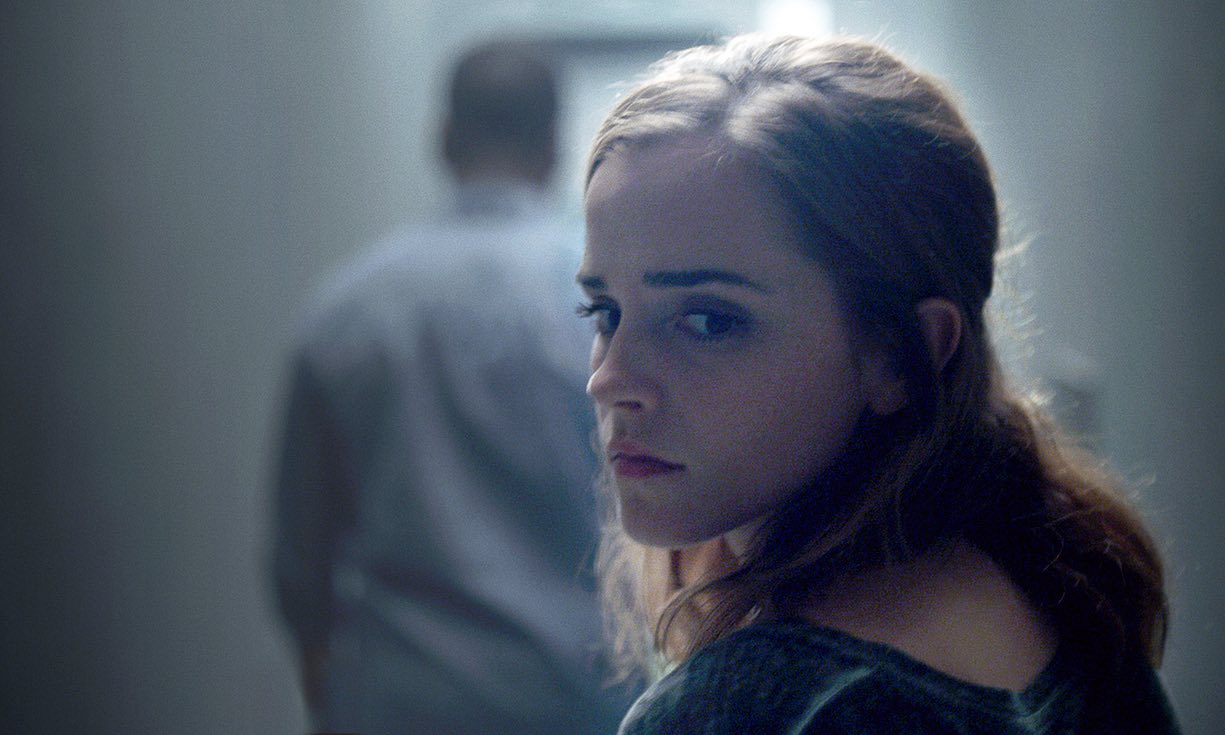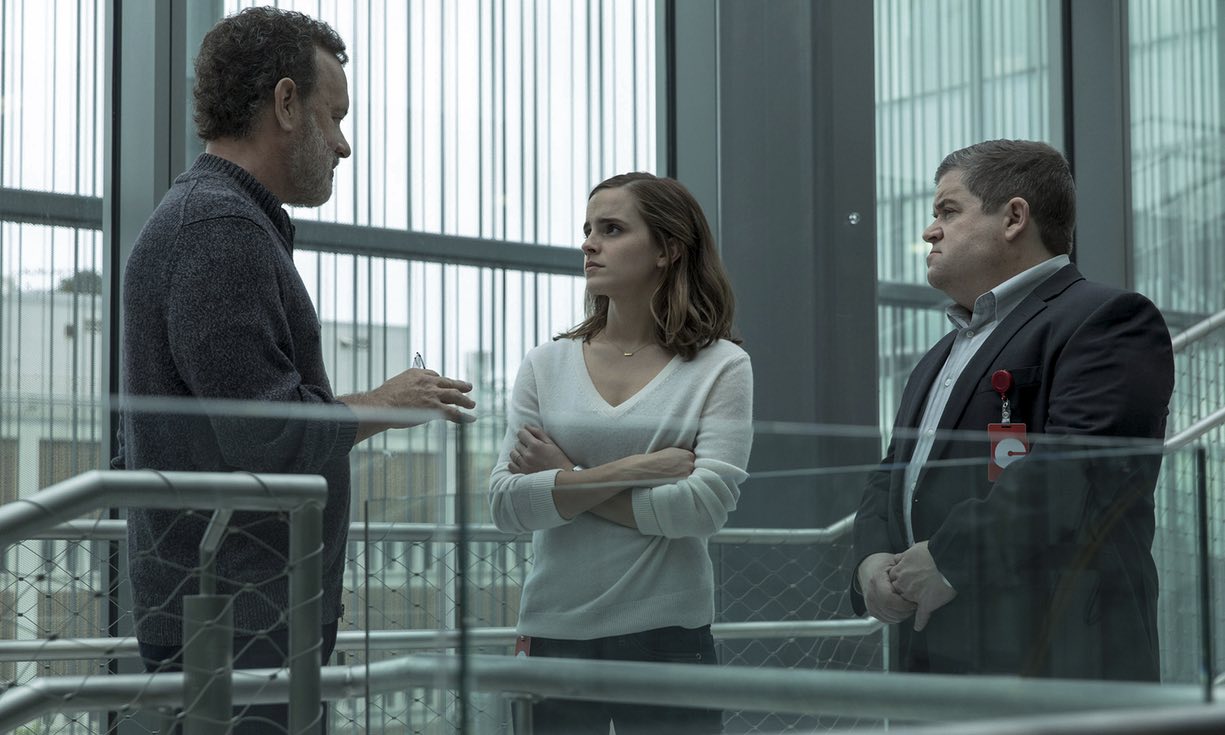
Emma Watson in The Circle. ‘The Circle is a cartoon. It’s not real. Facebook is real, and it’s scary.’ (Photograph: Courtesty of EuropaCor)
‘It’s spot on’: Facebook worker sees parallels with The Circle
The Circle envisions an omnipotent social media platform whose quest for tech utopia turns sour. Sound familiar?
May 2, 2017
Mark Zuckerberg ate two brats in Madison, Wisconsin this weekend, “basically inhal[ing]” the first before remembering that the entire reason he was in Madison eating brats in the first place was to memorialize the event with photographs. So he ordered another, and posed for the pic.That the Facebook founder and CEO’s latest trip through the heartland occurred on the weekend that the techno-dystopian thriller The Circle was released provided a helpful comparison between the menace of an endlessly rapacious social network as imagined in 2013, and the much more alarming reality of an endlessly rapacious social network in 2017.
The Circle gives us a hyperbolically evil version of social media, while Zuckerberg makes us feel like he’s our friend as he reduces us to data that can be monetized.
Or, as a Facebook employee who attended the movie with me put it: “No one would like [The Circle]. Facebook is insidious. It’s easy. It goes down smooth.”
The Circle’s TruYou combines aspects of all our technological overlords, from Amazon to Google to Apple, but the fictional company’s emphasis on the most personal minutiae of our lives – “Sharing is caring,” rapturous employees repeat during an all-hands meeting – makes Facebook its closest real-life analogue.
Some of the parallels between TruYou and Facebook hit home to Dan, a self-described “nobody” at Facebook who asked not to be identified to protect his job. The “overall vibe” of the tech company’s campus, with its constant activities like doga (yoga, with dogs) and visiting Tibetan monks, was “spot on”, he said, as was the general enthusiasm of employees for their employer.
“They’re all so happy to be there,” Dan said. “It’s insane.”
Other aspects of The Circle that may have seemed speculative when the novel it is based on was published four years ago have already come to pass.
The Circle founders’ interest in involving themselves in the democratic process – our hero Mae Holland proposes that every individual be automatically registered to vote, then required to vote through TruYou – has been explored by Zuckerberg over the past year or so . Not only has he embarked on his tour of the 50 states – mimicking a political campaign even if he’s not running for anything (yet) – but he has recently touted Facebook’s power as a tool to boost voter registration and participation.
Ditto for Facebook Live, the video streaming tool that mirrors the key plot device in The Circle – constantly streaming video cameras known as SeeChange that can be placed anywhere and everywhere, obviating privacy in favor of total transparency.
Just as SeeChange quickly devolved from fun and games to humiliation and death, so too has Facebook Live devolved from Chewbacca Mom to live-streamed rape, torture, suicide and murder.
“Those are the sorts of mistakes Facebook would make,” Dan said of The Circle’s faith in transparency and accountability through constant surveillance, “where they thought they were doing good but couldn’t control it”.

Tom Hanks, Emma Watson and Patton Oswalt in a scene from The Circle, the film about a fictional social network. (Photograph: Francois Duhamel/AP)
Still, one of Dan’s strongest critiques of the film was a key reason why the film feels so unrealistic: the total lack of critical thinking on the part of supposedly intelligent characters.
The Facebook workforce is “not some homogenous, dumbed-down, clap-for-everything crowd that’s like, ‘Yay! We hate privacy!’” Dan said.
By taking one aspect of Facebook’s power to a parodic extreme, The Circle fails to explore the subtler and more sinister aspects of our relationship to the social network, such as yesterday’s report that Facebook executives in Australia were bragging to advertisers about their ability to identify the emotional vulnerabilities of teenagers.
“As far as collecting everyone’s information and monetizing it, that’s already being done,” Dan said. “It’s not some dark, sci-fi dystopia. It’s reality.”
And that’s a reality that is much more interesting and troubling than the techno-Hogwarts we’re treated to by The Circle. No one elected Mark Zuckerberg for anything, but he has been liked by nearly 90 million people on Facebook and his power is arguably greater than any head of state.
“If you control information, you can control people’s minds, and Facebook is the one that decides all of this,” Dan said. “[Zuckerberg] runs Facebook. Why would he want to run for president? He’s already president of the world.”
Before we parted, I asked Dan which was scarier: The Circle’s corporate panopticon or what he described as Facebook’s “close to God-like powers”.
“The Circle is a cartoon. It’s not real,” he said. “Facebook is real, and it’s scary.”
This article was originally published by The Guardian. Read the original article.
